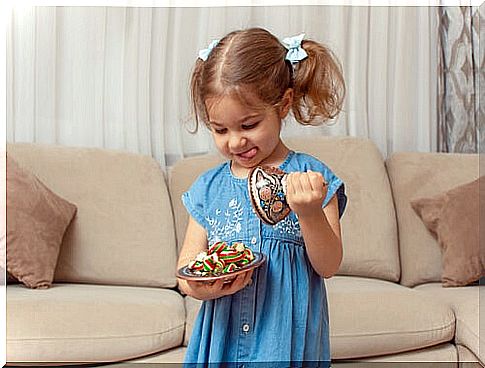Fruit Snack Challenge: Self-control In Children

The fruit snack challenge has flooded our social networks in recent weeks. On the Internet, they have also called it the challenge of patience and, in fact, it comes up with a fundamental developmental capacity: self-control in children.
The challenge is to fill a bowl with an attractive food for children, usually sweets such as fruit snacks . They are then placed within sight and reach, but the child is told that they will not be able to eat them until the parent is back. Then, a camera is recording the children alone while the adult leaves for a few minutes.
Children’s reactions are as unprecedented as they are varied. Some children show great self-control and even resort to distracting techniques such as singing or instructing themselves not to touch the snacks. Others bite only a small piece and leave it quickly regretful, while others are overcome by temptation and cannot resist taking them before the indicated time.

Background: Marshmallow Experiment
Actually, this new challenge has a precedent in the 70s known as the marshmallow experiment, which is a kind of candy. This experiment was carried out at Stanford University by researcher Mischel and his collaborators, who were trying to get answers about delayed gratification or delayed gratification and self-control in children.
The marshmallow experiment is similar to the fruit snack challenge , but in addition, it was proposed that if children were able to overcome the challenge, they would get twice as much candy as they were initially provided. Thus, they discovered that the children who passed the experiment used distraction techniques and self-instruction.
However, the biggest discoveries came later. When they evaluated these adolescent and adult children, they discovered other significant findings.
The children who passed the experiment had higher social skills and higher self-esteem. In contrast, the children who did not make it to the end of the experiment had higher levels of impulsivity, aggressiveness, and a greater likelihood of developing conduct-related disorders.
Self-control in children
Self-control in children is the opposite capacity to infantile impulsivity. In this way, it supposes an ability to regulate one’s own emotions and impulses. Self-control in children is actually quite a complex skill. In addition, it requires training and is especially difficult to handle up to 4 or 5 years.
This ability influences all important areas of the child and, for this reason, is related to the development of difficulties in later stages. For example, in the social sphere, self-control in children is especially important in terms of respecting the speaking turn, controlling tantrums, sharing and respecting the properties of each child, etc. In the same way, low self-control will lead to poor regulation of emotions and the child can be overwhelmed in everyday situations.
There are some childhood disorders in which self-control can be especially compromised, such as attention deficit disorder or AD / HD. One of the main characteristics of this disorder is impulsivity that compromises your daily life and even your physical health by having frequent accidents and falls.

How to assess self-control in children?
The fruit snack challenge is a challenge that has entertained social media users by witnessing the strong internal struggle (or not) that some children have to be able to show their self-control. However, there are some signs of daily life that allow us to assess this ability.
- At school, children can be patient : they wait to hear their name, raise their hands to speak, respect the established speaking time and do not interrupt the class very frequently.
- In the social sphere, they establish dialogues and games in which they are not always the center of attention and, in no case, do they seem like monologues. In addition, they are gradually more open to the possibility of sharing.
- In the family environment, children who gradually develop their self-control show, as they grow, more and more self-calming skills during tantrums and learn to accept more and more the little frustrations of daily life.
The self-control capacities that have been described are still an ideal and a model to guide us. Not all children develop this ability in the same way and at the same time. Thus, not all these skills are acquired and there are no longer any related difficulties: learning is a circular process.
As we have seen, the fruit snack challenge can be a fun time with children to learn how they handle situations that require self-control and, above all, appreciate the importance of gradually acquiring this skill.
A good way to educate self-control in children is precisely by behaving as good models of self-control. Remember that in your education you are two parts of a mirror.









